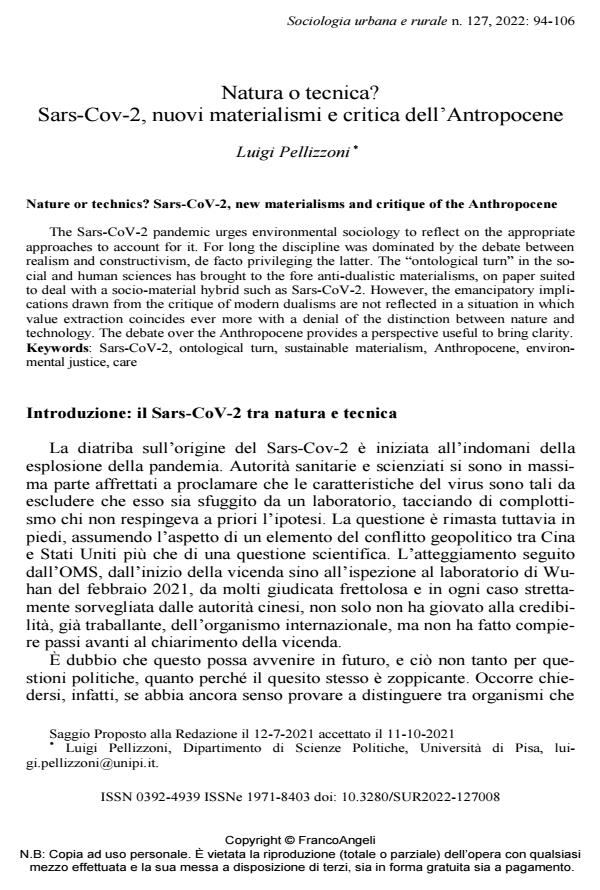Natura o tecnica? Sars-Cov-2, nuovi materialismi e critica dell’Antropocene
Titolo Rivista SOCIOLOGIA URBANA E RURALE
Autori/Curatori Luigi Pellizzoni
Anno di pubblicazione 2022 Fascicolo 2022/127
Lingua Italiano Numero pagine 13 P. 94-106 Dimensione file 284 KB
DOI 10.3280/SUR2022-127008
Il DOI è il codice a barre della proprietà intellettuale: per saperne di più
clicca qui
Qui sotto puoi vedere in anteprima la prima pagina di questo articolo.
Se questo articolo ti interessa, lo puoi acquistare (e scaricare in formato pdf) seguendo le facili indicazioni per acquistare il download credit. Acquista Download Credits per scaricare questo Articolo in formato PDF

FrancoAngeli è membro della Publishers International Linking Association, Inc (PILA), associazione indipendente e non profit per facilitare (attraverso i servizi tecnologici implementati da CrossRef.org) l’accesso degli studiosi ai contenuti digitali nelle pubblicazioni professionali e scientifiche.
La pandemia del Sars-CoV-2 sollecita la sociologia dell’ambiente a interrogarsi sugli approcci adeguati a renderne conto. A lungo la disciplina è stata dominata dal dibattito tra realismo e costruttivismo, de facto privilegiando quest’ultimo. La "svolta ontologica" nelle scienze sociali e umane ha portato alla ribalta materialismi anti-dualisti, idonei sulla carta a confrontarsi con un ibrido socio-materiale quale il Sars-CoV-2. Tuttavia, le implicazioni emancipative tratte dalla critica dei dualismi moderni non hanno riscontro in una situazione in cui l’estrazione di valore coincide sempre più con la negazione della distinzione tra natura e tecnica. Il dibattito sull’Antropocene offre una prospettiva utile a fare chiarezza.
Parole chiave:Sars-CoV-2, svolta ontologica, materialismo sostenibile, Antropocene, giustizia ambientale, cura
Luigi Pellizzoni, Natura o tecnica? Sars-Cov-2, nuovi materialismi e critica dell’Antropocene in "SOCIOLOGIA URBANA E RURALE" 127/2022, pp 94-106, DOI: 10.3280/SUR2022-127008